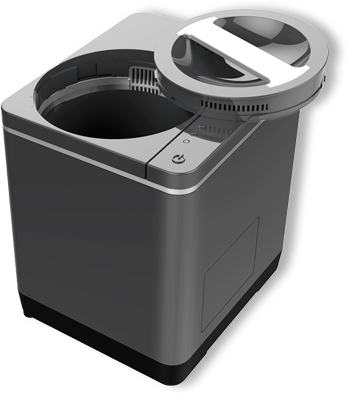Fun with Life-Cycle Analyses

Let’s say you’re trying to make an environmentally based decision on disposable vs. cloth diapers. Disposable diapers come from various substances that are synthesized from raw materials, then manufactured, packaged, shipped, purchased, consumed, and thrown into landfills. That may sound terrible until you run the numbers on cloth diapers. Yes, since they are re-used, one consumes fewer of them, but they come from cotton that is fertilized, irrigated, harvested, manufactured, shipped, purchased, used, repetitively washed with water heated by some generally non-renewable energy source, cleaned with soap that has its own eco-print, and dried with additional energy.
Now, let’s talk about this product that turns food waste into fertilizer. Its LCA contains the extraction of the the raw materials of all its parts, machining, and manufacturing. But the “waste” really hits the fan when it’s used. It draws current from the grid for three straight hours per use. This results is a handful of fertilizer that may microscopically reduce the user’s purchase of these chemicals.
Challenge: If this product has a net benefit to the environment, I’ll eat a handful of its product.

Craig,
At some point you really must get a life!
All around you is emerging truly amazing new technologies. Major changes in the way humans live and even transform human civilization.
But lately, you seem to have narrowed your world down to five themes;
1) Hate Trump!
2) Repetitions of Climate Change dogma from increasingly obscure sources
3) Hate Coal, fossil fuel
4) Ridiculing,without research obscure individuals and products
50 Hate Trump more…
Time to move on with a broader, more optimistic and involved outlook, don’t you think? Avoid becoming a GOM ? (grumpy old man).
Craig,
What is not expressed here is: How MUCH power does it draw from the grid.
It takes my phone about 3 hours to fully recharge, but I assure you that I’m not drawing much energy to do so.
🙂
I’ve gone back and forth and back again on the issue of landfill waste… and I’ve come to the conclusion that – like water – it depends on where you live.
In a very high population density area, landfill issues are serious ones. NYC, for instance, sends its trash to landfills in Pennsylvania and upstate NY, requiring the trash to be driven out of the city, loaded onto barges or trains, and then transported to a port or station where it is loaded onto trucks, and transported to the landfill. If you reduce the mass being transported at that scale by a few dozen tons per year… that is a significant offset of transport energy which could easily dwarf the grid energy required to compost that same trash.
In lower population density areas, the problem is not nearly so great… as cheap land is relatively abundant rather close to the locus of trash production. For me, the landfill is about 20 miles from my house. The trash that I take to the street might – over the course of a year – result in at most 2-3 additional gallons of diesel, or ~35-60 additional kg-CO2e, depending on many factors.
I obviously recycle aggressively, but doing more would not result in a significant reduction in net emissions, especially considering the fact that the landfill itself is a form of carbon sequestration/quazi-renewable energy resource.